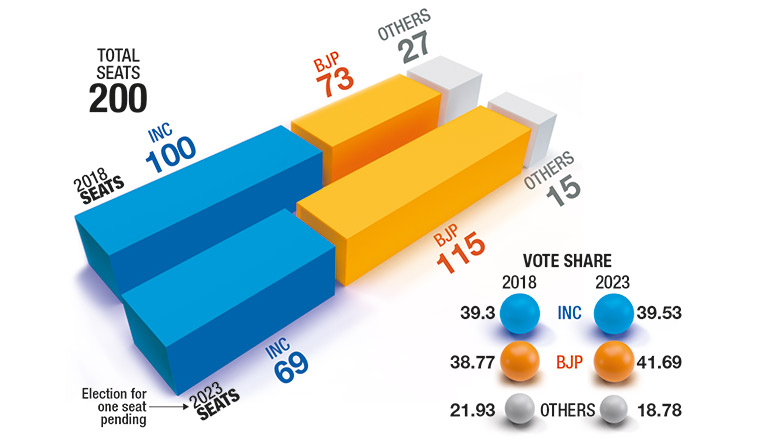IN RAJASTHAN, THE BJP would want to change the very convention that brought the party back to power–alternating government in every election. Thanks to a mixture of governance and welfarism, garnished with a generous dose of hindutva, the BJP has been able to retain power in most of the Hindi belt states.
The BJP’s aggressive campaign in Rajasthan was centered on governance through Modi guarantees, which triumphed outgoing chief minister Ashok Gehlot’s seven promises. The second aspect of the campaign had a strong hindutva connect as the BJP targeted the Congress government over appeasement and made the beheading of tailor Kanhaiya Lal by two Muslim men in Udaipur a recurring theme.
The polarisation was complete when the party did not accommodate even a single Muslim candidate, which has been the BJP’s strategy in recent assembly elections. Instead, the BJP brought in four saffron-clad monks in the minority-dominated seats. All four (Baba Balaknath, Balmukund Acharya, Mahant Pratap Puri and Otaram Dewasi) won. Balaknath, a Nath yogi like Uttar Pradesh Chief Minister Adityanath, had been seen as a chief minister face since the campaign began.
The new dispensation in Rajasthan will be under pressure to adopt a UP-style aggressive governance, which, among other things, includes delivering swift justice. Even the mild-mannered Madhya Pradesh Chief Minister Shivraj Singh Chouhan had to resort to ‘bulldozer justice’ in the recent past to divert public anger following a grievous crime.
The BJP had made Prime Minister Narendra Modi the face of its campaign. The experiment paid off; BJP won 115 of 199 seats, and the Congress a distant 69. The party had mixed results for its decision to field seven MPs: Only four won (Diya Kumari, Baba Balaknath, Rajyavardhan Rathore and Kirodi Lal Meena), and they are likely to find a place in the state cabinet.
“The victory has been possible because of the work of our cadres,” says Arun Singh, BJP general secretary who is in charge of the state. “The poor and farmers have trusted Modi.”
While the BJP went for the kill, many things went wrong for the Congress. For one, Chief Minister Ashok Gehlot carried the campaign and made all the decisions himself. He even overlooked the party’s internal surveys, which suggested replacing 50 MLAs facing public anger. Most of them, including 17 ministers, lost. The cases of paper leaks, crime against women and ‘red diary’ helped build a perception against the government. Such was the BJP’s onslaught that Congress could not win a single seat in over half-a-dozen districts like Bharatpur, Jaisalmer, Rajsamand, Bhilwara, Chhittorgarh and Pratapgarh.
The changing dynamics showed how the dalits and the tribals were rallying behind the BJP. Of the 34 seats reserved for Scheduled Castes, BJP won 22; it won 12 of 25 seats reserved for the Scheduled Tribes.
Also Read
- How BJP's planning made the difference in MP, Rajasthan and Chhattisgarh
- Assembly losses force Congress to rework its strategy for LS polls
- BJP next target in MP? 51 per cent vote share in 2024 LS polls
- 'Want to serve people till my last breath': Shivraj Singh Chouhan
- How Revanth Reddy won a battle of personalities against KCR
- Ten reasons the BRS could not score a hat-trick in Telangana
The sidelining of former deputy chief minister Sachin Pilot cost the Congress dear. In eastern Rajasthan, which has 25 seats spread over five districts―Bharatpur, Dausa, Dholpur, Karauli, Sawai Madhopur―the BJP won 13. In 2018, it had won a solitary seat when Sachin Pilot, as Congress president, was the face of the party’s campaign.
The silver lining for the Congress is that the chances of Pilot getting a clear mandate to handle party affairs are high following the debacle. “The party will discuss the shortcomings and the way forward,” says Pilot. “We will continue to remain among people as their voice. I have always been in favour of the youth, they should be brought forward.”


